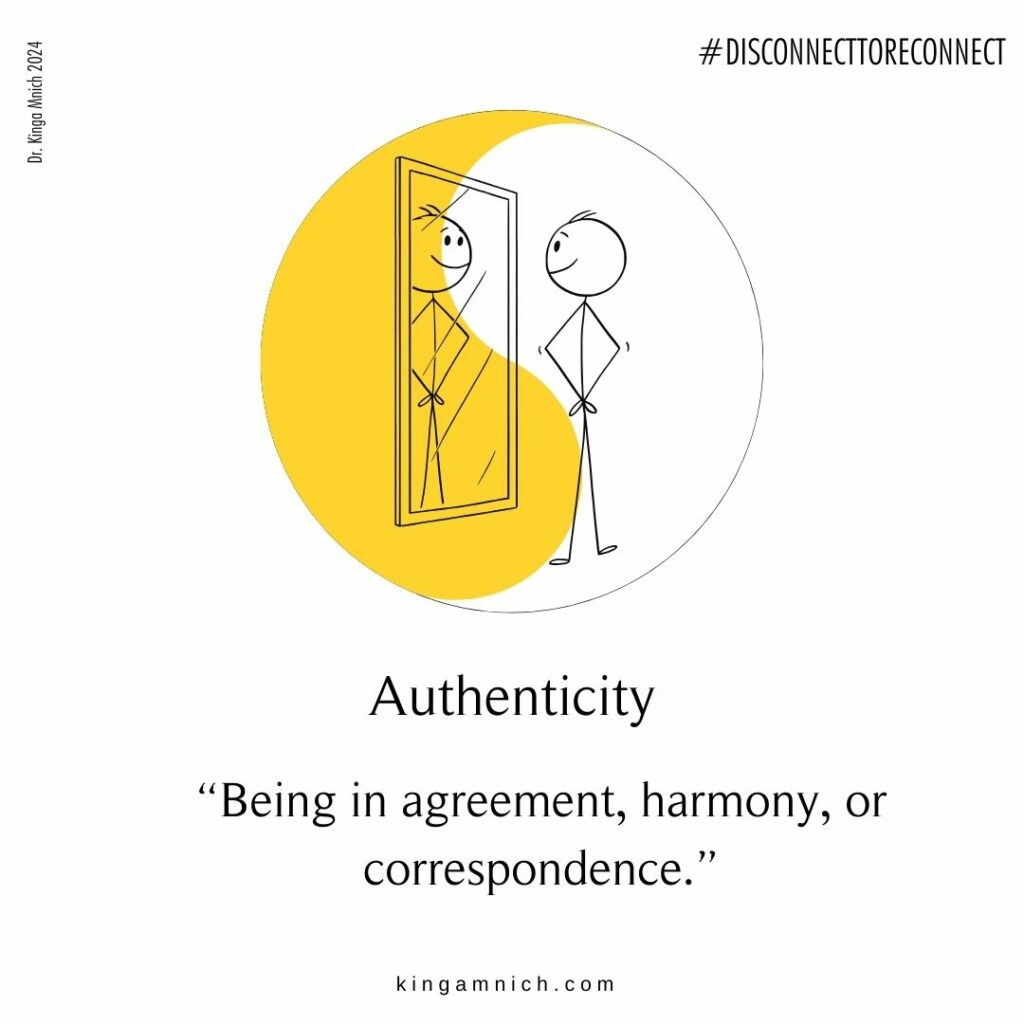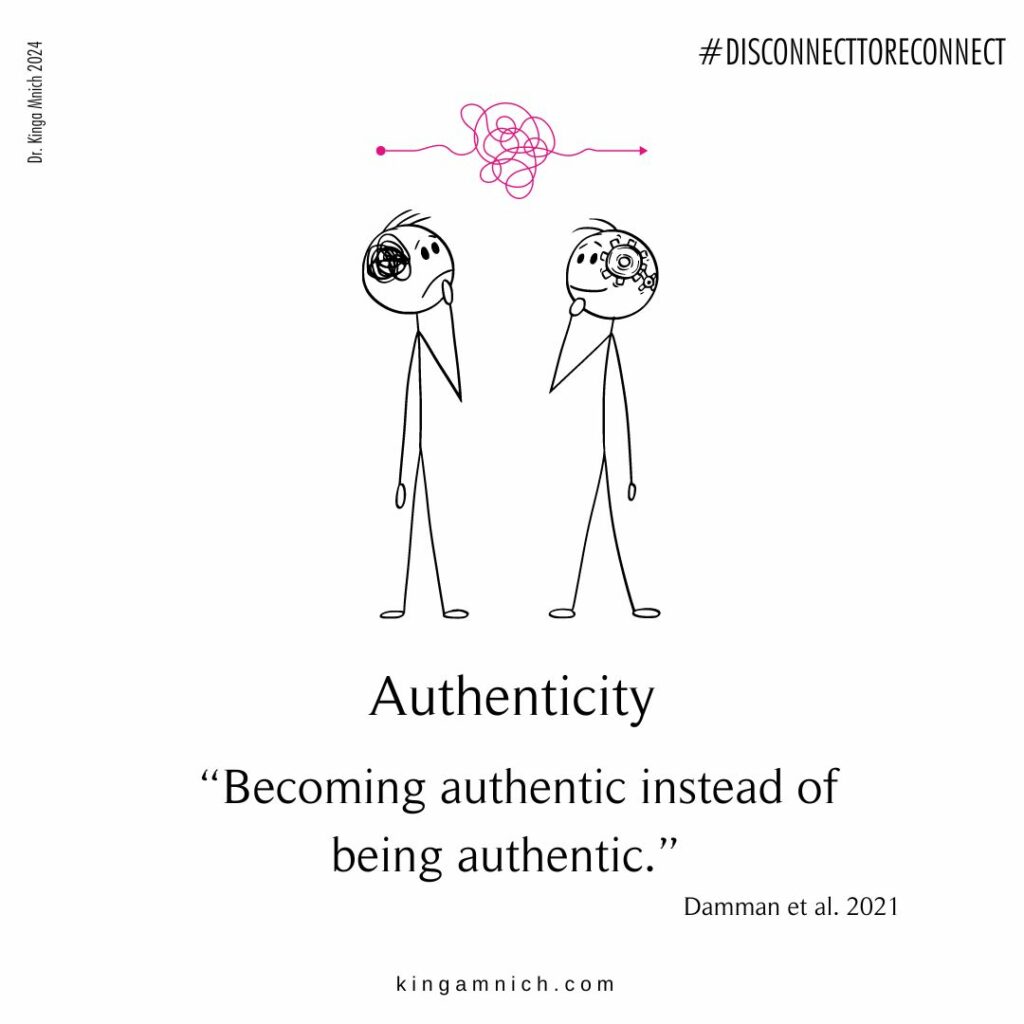Explore how to balance effective leadership and authenticity as a woman, embracing your true self while leading effectively. This blog post provides strategies to leverage your unique strengths and maintain genuine connections in your leadership role. Stay true to your values and thrive as an authentic leader.
How to Be a Good Leader While Staying True to Yourself as a Woman.
I often get asked, “How do I become a good leader and stay true to my feminine side?” or “How can I lead without giving up what it means to be a woman?”
When asked about this, most people (in this case, more particularly women) wonder how to remain genuine in a world that pressures them to conform—a world that nonchalantly tosses around the concept of authenticity while simultaneously assigning people specific roles.
No wonder there is confusion about the concept of authenticity and how to use it in the professional world.
Table of contents
- What is authenticity?
- Let’s start with a scientific perspective.
- Psychology and authenticity.
- Self-Determination Theory:
- Feminine Leadership – or simply staying true to your feminine side while leading
- 1. Embrace Your Authenticity
- 2. Leverage Your Unique Strengths
- 3. Cultivate Self-Awareness
- 4. Set Boundaries
- 5. Lead with Empathy and Compassion
- 6. Stay Flexible and Open to Growth
- 7. Advocate for Yourself and Others
- 8. Seek Support and Mentorship
- Let’s summarize
- Literature:
What is authenticity?
Most of us have a good sense of what it means to be authentic. That is when conversations flow, and you can focus on the other person without worrying about judgment or repercussions for expressing who you are and what you think. For others, it means being in a state of balance and being true to yourself (whatever self means in this context ;-P).
Let’s start with a scientific perspective.
Overall, there is an agreement in research that the term “authenticity” refers to what is real, genuine, or true (Lehman et al., 2019). How often have you found yourself describing a person as genuine or real? What did you refer to when you did that?

When I describe a person as authentic, I refer to a sense I have about the person. It is a feeling of comfort, nonjudgment, trust, and integrity.
In academia, authenticity is described in three dimensions. First, consistency is the congruous relationship between an entity’s external characteristics and its internal values. Second, authenticity as conformity is the congruous relationship between an entity and its social norms. Third, authenticity as a connection is the congruence between an entity and “a person, place, or time as claimed” (Lehman et al., 2019, p. 3). Congruence refers to harmony or, as I like to describe it, integrity. Dammann et al. (2021) use congruous based on Merriam-Webster’s definition (Congruous, 2020), “being in agreement, harmony, or correspondence.”
A person is authentic to the extent that they are consistent in terms of their external expressions and their internal values and beliefs. In addition, they need to align with social norms and their situation.

Authenticity isn’t a static concept. Most researchers describe it as a dynamic concept rooted in evolution. Dammannƒ et al. (2021) further determine that “Going beyond the static view of authenticity allows for inherent changes in authenticity over time and places a greater emphasis on becoming authentic instead of being authentic.”
Psychology and authenticity.
In psychology, authenticity is, at its core, about being true to oneself. According to psychologists, authenticity involves being aware of and accepting one’s true self, including thoughts, emotions, needs, and values, and expressing these honestly in interactions with others. It is the alignment of one’s internal values and beliefs with external actions and behaviors.
Self-Determination Theory:
According to Ryan and Deci’s Self-Determination Theory, authenticity is about autonomy and the freedom to act in ways that are congruent with one’s self. This theory posits that individuals who pursue goals that align with their intrinsic values and interests are more likely to experience psychological well-being compared to those who conform to external expectations for rewards or approval (SpringerLink).
While psychology defines authenticity as living by one’s true self rather than conforming to external expectations or societal norms, social psychology and sociology refer to authenticity from a more holistic point of view, in my opinion.
As described above, authenticity is a dynamic interplay between these three dimensions:
- Harmonic relationship between your inner values and external characteristics.
- Harmony between you and social norms
- Harmony is between you during an interaction in a specific situation based on time and place.
Meaning: the concept of authenticity is not static but evolves as individuals grow and change over time.
In my experience, authenticity refers to the state of integrity—a place where you feel like you can simply be yourself without having to play a role or suppress characteristics that support your skills and talent. Authenticity isn’t something you can find within yourself as a fixed attribute. It is not a static piece of you. It is something that continuously evolves and is dependent on your environment.
Now that we have established what authenticity means, let’s return to the question of how you can stay true to yourself as a woman and be effective in your leadership role.
Feminine Leadership – or simply staying true to your feminine side while leading
Being an effective leader while staying true to your feminine side involves embracing your authenticity and recognizing the unique strengths you bring to the table as a woman. Here are some practical steps to help you achieve this balance:
1. Embrace Your Authenticity
As discussed, authenticity is about aligning your internal values and beliefs with your external actions. To be a good leader, it’s crucial to understand and accept who you are. This means knowing your strengths, weaknesses, emotions, and values. Reflect on what matters most to you and ensure that your leadership style reflects these principles.
2. Leverage Your Unique Strengths
Women often bring unique strengths to leadership roles, such as empathy, collaboration, and emotional intelligence. You can use these qualities to your advantage. These traits can help you build strong relationships with your team, foster a positive work environment, and make thoughtful, informed decisions.
3. Cultivate Self-Awareness
Self-awareness is a cornerstone of authentic (and effective) leadership. Take time to reflect on your actions, decisions, and interactions with others. Seek feedback from trusted colleagues and mentors to gain different perspectives on your leadership style. This ongoing self-reflection will help you stay aligned with your true self and continuously improve as a leader.
4. Set Boundaries
Staying true to yourself means setting boundaries that protect your well-being and values. Know your limits and communicate them clearly to your team. This helps you maintain your authenticity and sets a positive example for others to respect their boundaries.
5. Lead with Empathy and Compassion
Empathy and compassion are powerful tools in leadership. They allow you to connect with your team deeper and understand their perspectives and needs. Leading with empathy creates an inclusive and supportive environment where everyone feels valued and heard.
6. Stay Flexible and Open to Growth
Remember that authenticity is a dynamic concept. Your understanding of yourself and your leadership style may change as you grow and evolve. Stay open to learning and adapting. Embrace new experiences and challenges as opportunities to develop and refine your authentic leadership.
7. Advocate for Yourself and Others
As a woman in leadership, advocating for yourself and others is important. Speak up about your accomplishments and contributions, and encourage other women to do the same. Use your position to promote diversity, equity, and inclusion in your organization.
8. Seek Support and Mentorship
Surround yourself with a network of supportive peers, mentors, and allies. These individuals can offer guidance, encouragement, and valuable insights as you navigate your leadership journey. Don’t hesitate to seek out mentorship opportunities and engage in professional development to enhance your skills and confidence.
Let’s summarize
Becoming a good leader while staying true to your feminine side involves embracing your authenticity, leveraging your unique strengths, and fostering a supportive and inclusive environment. You can lead effectively without compromising your identity by cultivating self-awareness, setting boundaries, leading with empathy, and staying open to growth. Remember, authentic leadership is about being genuine, empowering others, and making a positive impact while staying true to who you are.
Literature:
Dammann, O., Friederichs, K. M., Lebedinski, S., & Liesenfeld, K. M. (2021). The essence of authenticity. Frontiers in Psychology, 11. https://doi.org/10.3389/fpsyg.2020.629654
Freeman, R. E., & Auster, E. R. (2011). Values, authenticity, and responsible leadership. Journal of Business Ethics, 98(1, SI): 15–23.
Lehman, D. W., O’Connor, K., Kovács, B., and Newman, G. E. (2019). Authenticity. Acad. Manag. Ann. 13, 1–42. doi: 10.5465/annals.2017.0047
Nicolotti, M. and Magrin, M.E. (2021) ‘Authenticity: Psychological Perspectives and Operationalizations’, in Maggino, F. (ed.) Encyclopedia of Quality of Life and Well-Being Research. Springer, Cham. Available at: https://doi.org/10.1007/978-3-319-69909-7_104669-1 (Accessed: 13 July 2024).













7 Comments
This article beautifully captures the multifaceted nature of authenticity and its importance in leadership, especially for women. The dynamic perspective on authenticity, highlighting its evolution over time, resonates deeply. As a female entrepreneur, embracing and leveraging our unique strengths—such as empathy, collaboration, and emotional intelligence—can indeed foster a more inclusive and supportive environment. The emphasis on self-awareness, setting boundaries, and continuous growth is crucial. It’s inspiring to see how authenticity and effective leadership can coexist, allowing us to stay true to ourselves while making a positive impact. Thank you for this insightful and empowering read!
integrity—a place where you feel like you can simply be yourself without having to play a role or suppress characteristics that support your skills and talent.
This is so me ?? the older you get the more you understAnd who you really are and you began to accept you. Love how you brought out how we are not static but keep changing. What an wonderful article!
This is really thought-provoking advice. I could have really used your guidance in my early days as a leader in tech! But now, years later, what resonates with me the most is the piece about advocating for yourself and others. As you suggest, it is essential that women Speak up about their accomplishments and contributions, and encourage other women to do the same. This normalizes the idea of women taking credit where it is due, and changes the larger narrative about women and leadership. Great article!
7. ADVOCATE FOR YOURSELF AND OTHERS
As a woman in leadership, advocating for yourself and others is important. Speak up about your accomplishments and contributions, and encourage other women to do the same.
This deeply resonated. It has always been a struggle to speak up but I have learned the power of my voice and continue to grow in confidence in this area. Us women have something within us that the world needs – our voices matter deeply.
I LOVE HOW YOU HAVE LAID EVERYTHING OUT IN THIS ARTICLE!
THIS IS A TOPIC I’VE BEEN THINKING ABOUT FOR MYSELF THROUGHOUT THIS YEAR.
FOR ME, LEADING WITH MY FEMININITY MEANS BEING IN A STATE OF FLOW MORE THAN I’M IN A MINDSET OF “PUSH.”
THERE’S A TIME FOR EVERYTHING, BUT I REALIZE THE MORE I STAY FOCUSED ON A FEW FUNDAMENTALS, I CAN BE IN A FLOW STATE MORE OFTEN THAN A PUSH STATE and I enjoy my work and my life a lot more.
I love how you brought in the scientific background of authenticity so we can understand it more comprehensively. I am a huge advocate of being our authentic selves and love how you provided ways for us to bring it more into our lives.
Okay, I’m loving your take on authenticity in leadership! ?
It’s so refreshing to see someone get that being ‘real’ isn’t just a fixed thing – it grows with us. And balancing that genuine you with boss-level skills? Spot on!
Thanks for the food for thought!